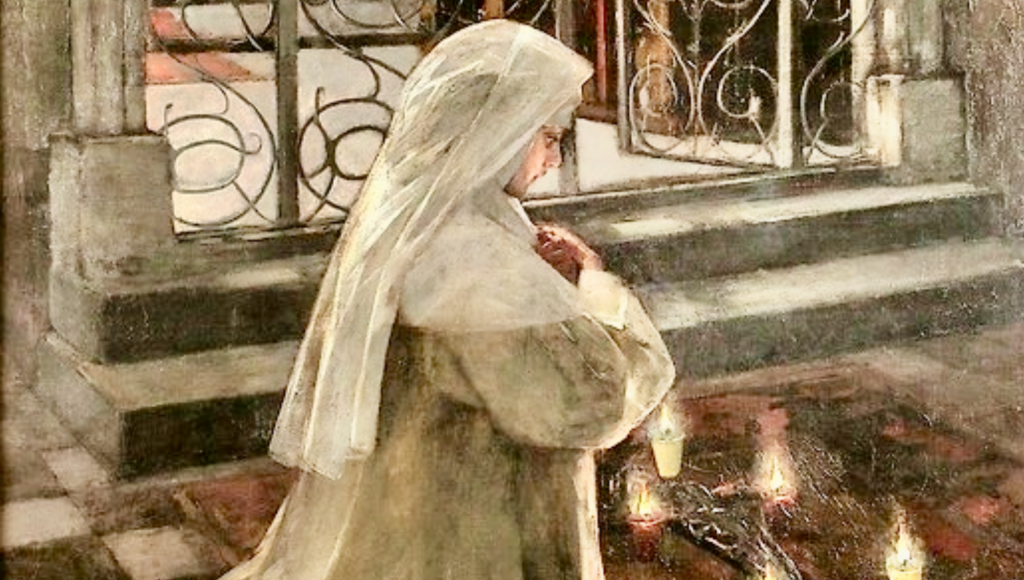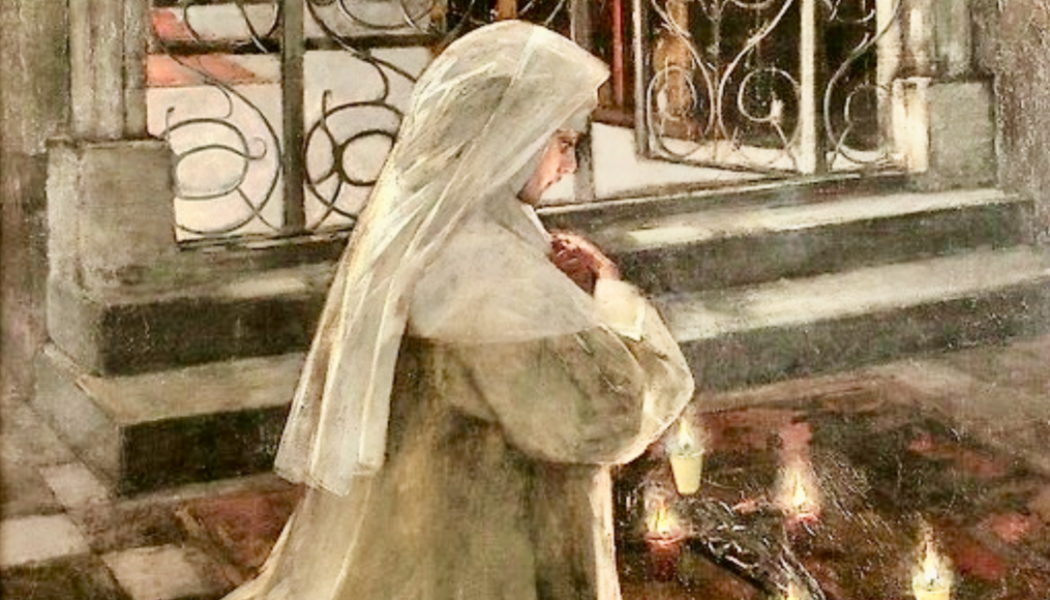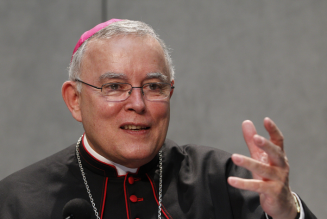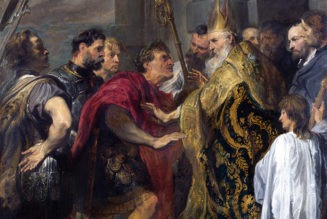
The problem with the cloistered nun is that to describe her in terms of her “usefulness” is to have fundamentally misunderstood her. Her life was already obscure; now it is hidden nearly in full. To think of a “useful nun” renders her true meaning invisible, decrowns her vocation of its glory. Yet, this seems to be the only category by which contemporary Americans are able to entertain the idea of monastic life. Throw away the concept of “usefulness” and being a nun ceases to be a legitimate “lifestyle” altogether. Even so, the attempt is made to fit her into contemporary categories.
1. An Honest But Failed Attempt to Understand the Nun
Most people are simply surprised to learn that the antiquated religious sister is still around at all. Could there really be young women today (in 21st-century America, no less!) who are actually willing to give up their hard-won right to liberty “and the pursuit of happiness” for a vow of obedience to the patriarchy, that is to say, to the Church? It’s illiberal and backward, a waste of talent and a waste of a life—or, at best, a rare and unusual “lifestyle choice.”
But, however odd it might be to give up a normal life of pleasure-seeking and dream-pursuing, the liberal-minded American can at least make sense of the young woman who wants to be an active religious sister: she is useful. This is the place, the category, where a Mother Teresa-type figure can snugly fit into the liberal framework. Perhaps her life isn’t exactly about an individual “pursuit of happiness,” if she herself is giving up so much, but isn’t she helping everyone else reach it? And that’s a kind of happiness—maybe even a better one. Her goal is to make the world a better place, one in which more people are free to pursue a life of success and happiness, instead of being constrained by poverty or lack of education. And that’s a dream, isn’t it? So, in the end, she really is pursuing her own kind of happiness: by being useful, by making a positive difference in the world. In this way, the active religious sister can be made comprehensible within the liberal project as a sort of sacrificial enabler of the free, individual pursuits of other people—other people who almost certainly aren’t living like her. But a cloistered nun? The liberal doesn’t know what to do with her. Like the commons, or an authoritative custom, she’s simply off the map.
Modern liberal society recognizes, chiefly, two main values: pleasure (understood broadly to include everything from superficial pleasures to genuine self-fulfillment) and usefulness (usually in terms of money, and usually for the sake of further pleasures). So, if a young woman today has abandoned a life of earthly pleasure to take the habit, then, by process of elimination, she must be trying to do something useful. She must, of course, be another Mother Teresa, trying to “make a positive difference in the world.” But, it takes a lot of imagination to see what on earth a cloistered nun could be useful for—or, at any rate, to see how being locked behind door and grill could possibly be better than making an active difference out in the world.
Active religious sisters, of course, do make a real difference: you can find them doing anything from teaching the young to caring for orphans, from feeding the poor to assisting single mothers. Put bluntly, they could be redescribed as social workers the government doesn’t have to pay. So, even while their claims to be virgins mystically married to Christ might sound odd, we certainly don’t mind having them around. Their religion and its medieval promises can serve as their salary. But the contemplative nun is utterly impractical. She’s the opposite of a free resource: she’s a resource-suck. She takes up space in a monastery that builds no wealth, provides no jobs, and produces no goods—unless homemade soaps and jams count. Indeed, those crafts and fundraising products of the cloistered—the fruitcakes of the Cistercians, the coffins of the Trappists, etc.—often save the American Catholic from resounding embarrassment, enabling him to pretend that his religious orders are artisan communities doing something.
But, if we’re being honest, these lovely crafts don’t really amount to doing something, and certainly not anything recognizable as a public good. The cloistered nun doesn’t train young children how to be good citizens; she doesn’t do the honorable work of raising up the next generation of economic-contributors or positive-difference-makers. Instead, she leeches off the wealthy—begging for money and donations to sustain her small, functionless, productionless community. Or, she leeches off their children: taking their hard-earned Ph.D.s and fancy internships behind the cloister walls and—after a nice, long, useless life—into the grave.
Not all would be so cynical as to totally reduce the value of the cloister into raw monetary categories. Still, the nun must be accounted for. What is this woman’s role in the social order, if she runs neither household nor soup kitchen? A common attempt to make sense of her lifestyle, one I have heard a fair number of times, runs something like this: “So, although they aren’t teachers or serving the poor, they are praying for the world and for the people doing those things?” Intercessory prayer, then, is the only option left. Prayer is what makes nuns useful. Now, we must give this honest attempt its due: it is a rather sincere and faith-filled response to assume a nun’s usefulness for society comes from her prayers. For, in order for this perspective to be persuasive at all, one must actually believe in the order of grace; one must affirm that prayers are efficacious, that the life of grace is—perhaps—even more efficacious than a life of service.
And yet, the belief that the vocation of the nun is to pray for the world outside her walls is wrong.
The truth is that the cloistered nun is not meant to be, first and foremost, an invisible prayer warrior; her primary vocation is not fundamentally that of intercessor. Of course, her prayers are very powerful—and, I daresay, the Church would hardly hold together without them. Yet, they are not what the life of the nun is for. “Useful” prayer is not the reason why she is; it is not the reason why the nun exists as a nun. The first step to understanding the cloistered nun at all is to throw the term “useful” out the window.
2. The Purpose of the Nun
The cloistered nun is useless. And this is exactly the point. The nun does not exist for some job, some role, some mission. She fundamentally exists not to do but to be. She exists for God alone. This is the purpose of her life: to be totally available to God, to contemplate and to love Him with the whole of her being. Intercession, then, is not really the thing giving her vocation its fundamental rhythm and shape. Rather, it is merely one expression of a life that is totally consecrated to God. Furthermore, the nun is perfectly aware that God, in no wise, is in any need of her service to accomplish His will. Indeed, anything she could do, He could do immediately or accomplish in another way. She knows, therefore, that she is being called away from the world not on account of how useful she is to Him, but simply on account of His love for her and His invitation to know Him in a particular and intimate way.
It is a humbling vocation, then, for its very structure, its very way of life, is a constant reminder to the nun that her worth lies not in anything she can do, but that—in spite of her nothingness and unworthiness—God loves her and desires to elevate her to be His bride, to live that spousal reality here and now on earth. The Lord’s affectionate words to St. Catherine of Siena perfectly capture this humbling, yet glorious reality: “You are she who is not; whereas I am He who is.”[1] Truly, how could someone who is “not” accomplish anything useful, especially measured against He Who Is? No, she who is “nothing,” in order to do anything at all, must first be “she who receives.”
The nun, then, especially when considered in her nothingness before God, is revealed as fundamentally useless—and, in the end, so are we. For everything we could say of the nun in this regard we ought to say of ourselves. She is a sign, therefore: a reminder of our own uselessness. We cannot claim that any part of our existence, even our vocation, derives its fundamental meaning from its usefulness to God—or even from its usefulness to other people. Anything we do, He could do immediately or have had done by another creature. In the end, what a mystery it is that He is pleased to use us at all![2] And so, we all can equally join in the resounding heavenly anthem: “I am she who is not, You are He who is!”
However, our tendency to fixate on quantifiable measurements and production obscures this reality. This is the trouble of living the “active” rather than “contemplative” life. But, when we see the nun, when we cannot make sense of her in terms of usefulness alone, she is able to highlight for us the truth of our own reality. In this way, she is truly a sign—but, it must be emphasized again, even this role of “being a sign” cannot be reduced to usefulness, as if we have somehow discovered her real job, the ultimately useful thing she was made for. No, her “being a sign” is not a job description, but simply what she is: she is one who exists for God alone, and this existing-for spills over as an abundant outpouring of meaning, a meaning that overflows from her very self, out into the world.
This, then, is the way we ought to regard anything “useful” that the nun does, or, indeed, anything “useful” that we ourselves accomplish: as something secondary rather than primary, as an overflow of who we are before God, rather than our central purpose. This is the reality revealed by Jesus’ own teaching when He exhorts us, “But seek first his kingdom and his righteousness, and all these things shall be yours as well.”[3] Jesus promises that we shall receive “all these things” from the Father as an overflow, as an effect of first seeking the kingdom; just so, our usefulness is a secondary aspect of who we are, and the good things we are able to accomplish are possible only because God made us for Himself primarily. By our very nature, anything useful we do is ultimately the result of a more fundamental relationship: one in which we must “become like children” who are loved for their own sake and not for their usefulness.[4]
The merits of a nun’s prayers for the Church are not her central purpose, but an overflow of her primary vocation as bride. Her prayers are indeed efficacious and useful for the Church; in fact, her solitary life of prayer is far more powerful than any act of service she could do out in the world. Thus, the paradox of the nun: her prayers are so powerful and “useful” for the salvation of the world precisely because of her fundamental uselessness before God. “I will all the more gladly boast of my weaknesses,” Paul writes, “for when I am weak, then I am strong.”[5] This is the secret of monastic life.
3. The Nun as a Sign, a Rupture, and a Model
The cloistered nun, then, is a revelation of something beyond the liberal framework. Man, according to liberalism, is a rational actor, individually seeking his own pleasure and happiness. Politics, governance—all that is a compromise everyone must make in order to maximize our own individual pursuits. But since a nun cannot be reduced to an individual seeking a life of pleasure through compromise and contract, nor can she be considered useful in any concrete way for the liberal ideal of “Progress” (whatever it might mean, exactly), she becomes invisible to the liberal order. Liberalism simply cannot see her, cannot comprehend her through its bare and cynical description of man and his movements. In order to “see” her, to explain the reason for her absurd mode of existence, the liberal must reduce her, warp her, to fit inside a preconceived framework. If the nun, as the Church knows her, is, in fact, real in the way she claims to be, what does her existence mean for a liberal order that has no place for her in its logic?
Contemplative religious life is a tear in the fabric of our modern ideology, revealing its political project as forever weak, forever incomplete, unable to extend everywhere it purports to belong. Its totalizing reach cannot be realized so long as this gap exists, so long as there are those who live in such a way that liberalism cannot map out. In fact, the cloistered nun reveals the very thing liberalism must deny: that man is made for God alone, and that this is the true content of his freedom and worth. Man is not free to pursue what he wills insofar as he wills it; to do that is, rather, his enslavement.
One must not think that this opposition is merely theoretical, something academics talk about in journals. It is evidenced quite clearly in history. The early liberals recognized that monastic life posed a threat to their regimes, and this led to confrontation. Monasteries were commonly faced with a mandatory decision either to abandon (or at least transform) their vows, and in so doing be made comprehensible to the liberal project, or to be extinguished as an institution all together. Some freely chose to “reform” their way of life, other convents were given no option and immediately suppressed.
Take, for example, the dissolution of monasteries during 18th-century France: as the revolutionary cries of “fraternity” and “liberty” increased, the advance against the Catholic Church steadily grew. The first significant political act against the Church took place in 1789, when the French State abolished the Church’s feudal rights. At first, this meant only a loss of her tax exemption status, but soon (within that very year), the State declared its ownership of all Church property.[6] So long as the convents operated sufficiently out of the way or (in the case of active orders caring for the poor) contributed to the public good, the government property was left in their care. However, despite keeping their heads down, this “leaving the convents alone” did not last long. The State soon changed its mind.
In 1790, amid Assembly meetings, Garat-Aîné contributed the following to a discussion on Catholic religious orders. For our purposes, this summarizes the general feeling at the time:
The rights of man—will they thus be won? This is the real question. Religious Orders are the most scandalous violation of them. In the moment of fleeting fervor, a young adolescent pronounces an oath to recognize neither father nor family henceforth, never to be a spouse, never a citizen; he submits his will to the will of another, his soul to the soul of another; he renounces all liberty at an age when he could not relinquish the most [modest] possessions; his oath is a civil suicide.[7]
The conclusion of these meetings produced a series of decrees that “essentially suppressed all the solemn religious vows in France.”[8] From that moment on, taking any new vows became illegal, and the currently professed were given the opportunity, if they wished, to be freed of theirs and return to the world. (And there were sisters who did take the opportunity, though not as many as the revolution expected). Finally, with all Church property under government control and much fewer religious, the State decided it best to combine the still-existent monasteries and sell the surplus property.[9] Evidently, the goals of the French Revolution and the life of the vowed religious proved incompatible.
This opposition continued in 19th-century Germany, which took up its own liberal smear campaign against the Church and included the popularization of monastic “atrocity stories.” These stories featured young women who were lured into convents, locked up therein, and (typically) subjected to torture, neglect, or sexual abuse. These articles, printed in liberal newspapers, inspired outrage and morbid intrigue, describing in gruesome and pornographic detail the alleged horrific treatment of poor, vulnerable, Catholic women.[10] In addition to this sensationalist approach, “leading liberals across the political spectrum from progressives like Rudolf Virchow to nationalist liberals like Heinrich von Sybel also condemned convents as detrimental to the education and life of girls.”[11] Their arguments came from a shared belief that,
[G]irls should be raised not to serve the church in convents but rather to assume their roles as mothers and wives in the family. Virchow, who later coined the term Kulturkampf, which included legislation closing contemplative religious orders, explained that female congregations drew girls and young women out of the family and then indoctrinated them with religious dogma. He believed the convents offered little instruction of practical worth and even less of intellectual value. Sybel, who was a prominent leader of the Kulturkampf, argued that since convents had nothing to do with the household and the family, they offered nothing for the preparation of girls and young women for their “true” duties. Serving neither the family nor the state but only the interests of the church, female religious orders and congregations, most liberals believed, drained the population of young women available for the duties of marriage and motherhood.[12]
Eventually the Germans, like the French, passed legislation to close the monasteries and female religious orders.[13] The cloister, so far as the liberals could tell, was patently useless for the public good of the nation, being not only a waste of life but also a disservice to national prosperity.
To evaluate women in this way, however, is to evaluate them as mere tools, as mere cogs in a machine. It is to see the human person as only a productive economic part that has meaning insofar as it contributes to the materialistic success of the nation. The cloister defies this kind of reduction. The nun, with her peculiar garb and haunting chants, reveals that there is a meaning for both men and women that transcends that of the bodily life. She reveals that there can, in fact, exist a society that is not constructed on the liberal premise of a fundamental conflict of “all against all,” mediated by contract and coercion, and forever oriented toward amassing power and material success. And this revelation, as we have just witnessed in our historical survey, is no insignificant thing.
It is no insignificant thing because what liberalism cannot see, it cannot control. And so, in actual practice, liberalism loses ground the more we live in a way that is invisible to its gaze, a way that is outside of its quantifying calculations. In the end, liberalism cannot motivate men and women who pursue neither pleasure nor usefulness but the common good. And this is precisely why liberal regimes are always involved in a deliberate effort to destroy the institutions and professed identity of the Church. Liberalism asserts that the common good is the will of the people, meaning that what is good becomes nebulous and its contents shift according to the whims of the multitude. But the Church asserts there is real content to the common good, and she asserts this on the basis of a divine authority, an authority that transcends the liberal map of reality. And what is this content? Precisely what the nun reveals: that the end of the social order is being for God alone, and doing this as society. In the final analysis, the common good is ultimately to be the Church, which is simply “humanity as social body” for God alone.
Therefore, it is by “seeking first” the kingdom of God—that is to say, by being the Church—and seeking “his righteousness” that we will secondarily receive “all these things” that we all desire and that liberalism aims to achieve on its own, without the help of grace: peace, liberty, diversity, fraternity, equality, happiness, etc. This is, and always has been, the bold claim of the Church: that the happiness of man, as society, rests on this “seeking first” and is fulfilled only as members of the one Body of Christ.[14] Therefore, it is this “seeking first” that will always be the most effective route in undoing the liberal order: it produces men and women who are determined and courageous, who live a societal life not contingent upon the liberal premise, who will—even naturally, and perhaps without great concerted effort—produce the social structures necessary for actual change.
So, in the final analysis, even the liberal complaints that monasteries are “utterly and completely useless to their neighbors” prove to be mistaken.[15] The nun or the monk belongs, first of all, to God. But whatever is given to God, and given totally and completely, is always given back with a hundredfold return. For this reason the monasteries played a fundamental role in stabilizing the nations in which they dwelt—although in a way that was unrecognizable to liberal economists until they were gone. An example of this can be found in the writings of William Cobbett, an English farmer and politician born in 1763, who, despite being a Protestant himself, bemoaned the loss of the English monasteries and the anti-clericalism of the Protestant Reformation in England and Ireland. “Upon the very face of it,” he first admits, “it appears monstrous that a house, a small farm, and the tenth part of the produce of a large estate, should have been given to a priest who could have no wife and, of course, no family. But, the fact is that the grants were for other purposes as well as for the support of the priests.”[16] According to Cobbett, the land had always been owned by relatively few wealthy lords, so, before the conversion of England, the care of the destitute was left in the hands of these land-owners. After her conversion, these same wealthy lords decided to build parishes conveniently located near their homes, and even handed over property and tithes in order to support the clergy in their ministerial work. But, along with this beneficence came the weighty responsibility of distributing this wealth for the sake of the poor. “Thus the providing for the poor became one of the great duties and uses of the Church,” and England was all the better for it:
For the uncertain disposition of the rich, for their occasional and sometimes capricious charity, was substituted the certain, the steady, the impartial hand of a constantly resident and unmarried administrator of bodily as well as of spiritual comfort to the poor, the unfortunate, and the stranger.[17]
While these Catholic institutions produced no great wealth and no new jobs, and, upon first observance, appeared to be a great leech on society, in reality they served the people so well that, Cobbett writes, “Englishmen in general suppose that there were always poor-laws and paupers in England. They ought to remember that for nine hundred years, under the Catholic religion, there were neither.”[18] It seems these apparently useless institutions were not so useless after all.
And is not this the very sort of thing the Church has invariably done, by virtue of who she is, in every generation and wherever she has taken root and grown throughout the world? Her work truly is the work of leaven,[19] gradually transforming the social order from within, lifting its structures up into the common good—and becoming so integral to society that her achievements and the effects of her beneficence often go unrecognized or taken for granted. Nietszche makes a similar observation, though concerning morality, about this effect of the Church and the problem left for the state once the institutions of Christianity are dissolved—much like the paupers left behind in the care of the English State:
When one gives up the Christian faith, one pulls the right to Christian morality out from under one’s feet. This morality is by no means self-evident: this point has to be exhibited again and again, despite the English flatheads. Christianity is a system, a whole view of things thought out together. By breaking one main concept out of it, the faith in God, one breaks the whole; nothing necessary remains in one’s hands…. When the English actually believe that they know “intuitively” what is good and evil, when they therefore suppose that they no longer require Christianity as the guarantee of morality, we merely witness the effects of the dominion of the Christian value judgment and an expression of the strength and depths of this dominion: such that the origin of English morality has been forgotten, such that the conditional character of its right to existence is no longer felt. For the English, morality is not yet a problem.[20]
Change, real cultural change, is slow, and happens over the course of generations, not years. It was a slow transformation, down through the ages, that finally produced what Nietszche refers to as modern “English morality”: a relatively new “intuitive” and “obvious” sense of what constitutes moral decency. The Christian source of this change, and especially the radicality of it, has by now been taken for granted. Furthermore, the kind of process that leads to such a transformation has likewise been overlooked. It should be no surprise, then, to anyone who pauses to wonder about it, that the history of the Church is filled with moral failures and backward thinking. Such is to be expected in any encounter with the Gospel—whether individual or social. Each age, each culture, has its own strengths and weaknesses in the effort to interpret and express the truths of the faith. The fallen aspect of human nature doesn’t simply disappear overnight: nations are not quickly healed, nor do cultures experience immediate transformation. And so, the universal Church, which transcends every age and nation, is patient. She, at the very least, understands that it takes time for leaven to make bread rise. Yet, she believes that this painfully slow and imperfect working out of grace is worthwhile, as it produces the deepest kind of cultural transformation. Building the City of God has never been a short-term project. It is not one today.
The cloistered nun reminds us that, despite appearances, the purpose of our lives is not to be useful—not for the liberal project, nor even for the Church. Rather, the meaning of every vocation is simply to be for God alone, a being-for that, as the monastery reveals, is never really useless in the end.[21] And so it is not surprising that the most fundamental and lasting contributions to the common good on the part of the Church have always begun from this humble place: by seeking first the kingdom of God and His righteousness. It is in this way, by living the truth that the cloistered nun reveals, that we ourselves will become an overflowing and efficacious sign that alone has the kind of power to transform our post-Christian liberal order.
Republished with gracious permission from New Polity, Issue 3.3 (Summer 2022).
The Imaginative Conservative applies the principle of appreciation to the discussion of culture and politics—we approach dialogue with magnanimity rather than with mere civility. Will you help us remain a refreshing oasis in the increasingly contentious arena of modern discourse? Please consider donating now.









